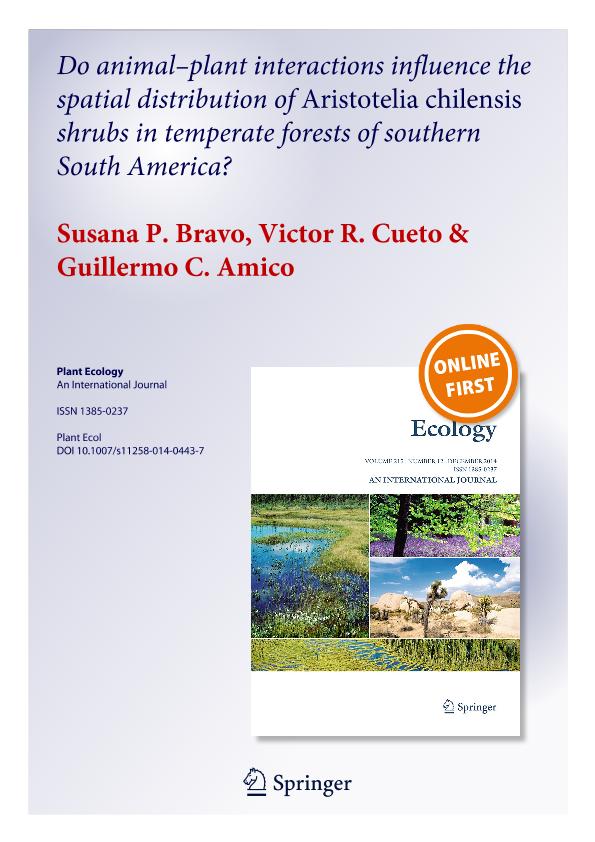Artículo
Do animal-plant interactions influence the spatial distribution of Aristotelia chilensis shrubs in temperate forests of southern South America?
Fecha de publicación:
01/2015
Editorial:
Springer
Revista:
Plant Ecology
ISSN:
1385-0237
Idioma:
Inglés
Tipo de recurso:
Artículo publicado
Clasificación temática:
Resumen
Seed dispersal constrains the environmental heterogeneity to which a plant species is exposed through its life. Behavior of seed dispersers and seed predators could be influenced by food availability and vegetation cover. Consequently, recruitment probabilities are heterogeneous in space and time, and “regeneration windows” may appear. Aristotelia chilensis is the most abundant fleshy-fruited shrub in the temperate forest of southern South America (TFSA). TFSA exhibits an environmental patchiness that could influence fruit abundance and animal behavior. Our objective was to determine the regeneration windows of A. chilensis, and to detect how forest structure and animal behavior could affect the spatial distribution of this species. We characterized forest structure in two plots that included mature forest, young forest, and open areas. We assessed the spatio-temporal distribution of A. chilensis fruits and studied fruit removal by animals. Also, we experimentally evaluated germination and post-dispersal seed predation. We developed a conceptual model to relate A. chilensis recruitment with forest successional stages. The fruiting individuals of this shrub were mostly located in fire-opened areas or forest gaps, and the seed rain generated by the migratory bird Elaenia albiceps was denser in these areas. In contrast, seed predation by rodents was higher in closed, young forest areas. A. chilensis recruitment follows a nucleation dynamic around fruiting females. Concerning forest succession, A. chilensis recruitment was higher near re-sprouting females in open areas, and lowest in young forests, where fruiting process was hindered by light constraints. When forests mature, new nucleation processes start around females surviving in gaps. We conclude that areas opened by disturbances provide a regeneration window for A. chilensis shrubs.
Palabras clave:
Seed Dispersal
,
Birds
,
Aristotelia Chilensis
,
Patagonian Forest
Archivos asociados
Licencia
Identificadores
Colecciones
Articulos(CCT-CENPAT)
Articulos de CTRO.CIENTIFICO TECNOL.CONICET - CENPAT
Articulos de CTRO.CIENTIFICO TECNOL.CONICET - CENPAT
Citación
Bravo, Susana Patricia; Cueto, Victor; Amico, Guillermo Cesar; Do animal-plant interactions influence the spatial distribution of Aristotelia chilensis shrubs in temperate forests of southern South America?; Springer; Plant Ecology; 216; 3; 1-2015; 383-394
Compartir
Altmétricas




